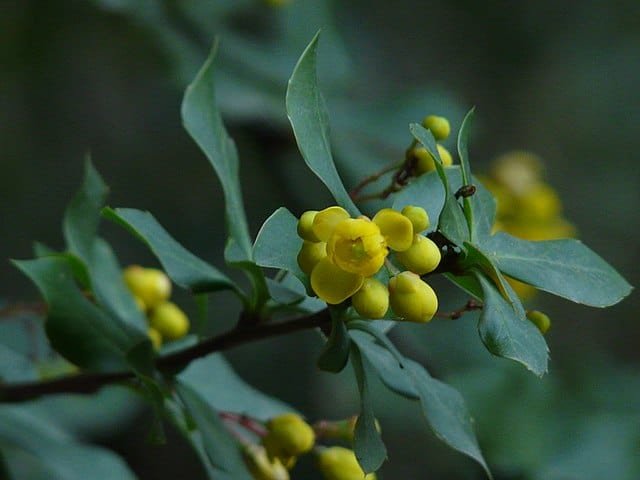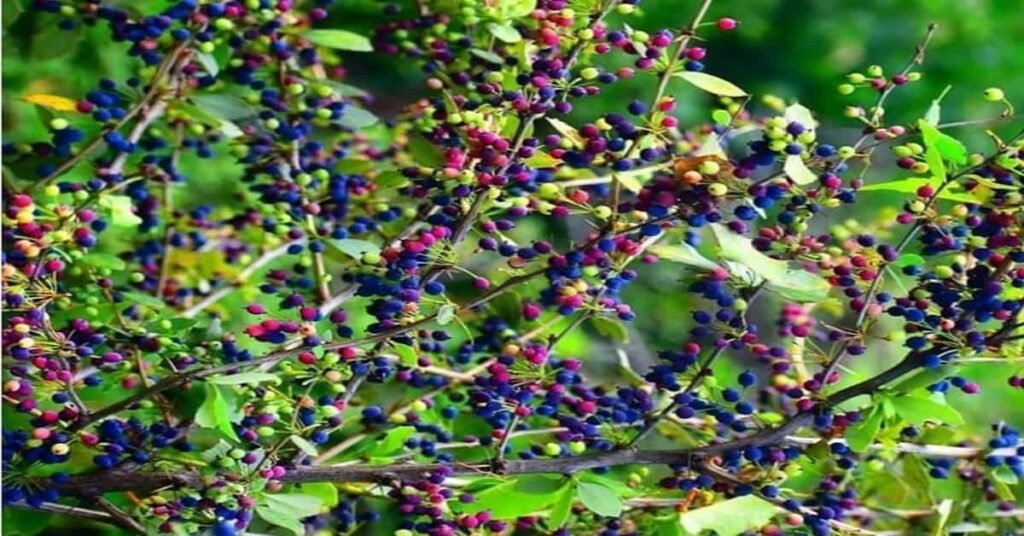Indian Barberry or Daru Haldi is a native Himalayan shrub and is also found in Southern India in Nilgiri hills and Sri Lanka. Indian barberry is also known as Berberis aristata (botanical name), tree turmeric, and Kilmora or Kingoda (common name in Uttarakhand). Stay with us till the end of this blog for more information.

Indian barberry is an erect, spiny evergreen Himalayan shrub that grows up to 2-3 m in high. Daru haldi is a woody plant with yellow to brown colored bark. The three-branched thorns cover the bark of the kilmora plant. It has toothed leaves that are leathery in texture and deep green in color. This plant produces yellow flowers and aconite violet-colored edible fruits, which are succulent and acidic and known to have medicinal properties. Kilmora fruit is juicy, contain plenty of sugar and is a rich source of Vitamin C and other nutrients. Local people eat it as a dessert.
Indian barberry or kilmora has been used in ayurvedic medicines for ages. The fruits, leaves, stems, bark, wood, and roots of kilmora plants get used in making medicine. This plant is known to possess antibacterial, antifungal, anti-inflammatory, and antioxidant properties and is used for treating inflammation, fever, infections, skin problems, wounds, diarrhea, and many more.
In addition to that, daru haldi is also a good source of dye and tannin and is used for dyeing clothes and tanning leather.
Indian Barberry/ Daru Haldi Uses
Below mentioned are different uses of Indian barberry
- The fruit, leaves, stems, wood, root bark, and root are used to make medicines.
- The fruits of Indian barberry are edible and are a rich source of vitamin C.
- Indian barberry helps you manage your blood sugar levels by increasing glucose metabolism. It also lowers the bad cholesterol levels in your body.
- The root bark of Indian barberry contains alkaloid berberine, which has antifungal, antibacterial, antioxidant, and antiviral properties.
- Kilmora plant is also used for the treatment of constipation and piles.
- Daru haldi paste is used externally for the treatment of wounds and burns.
- The roots of kilmora plants are used to treat fevers, ulcers, urethral discharges, jaundice, etc.
- It has effective anticancer properties and is used to treat colon cancer.
- Indian barberry is used for treating acne as it prevents the growth of acne-causing bacteria, thanks to its antibacterial properties.
- According to Ayurveda, you can use Daru haldi powder with honey or rose water to make a paste and apply it to burns for fast healing.
- Additionally, kilmora protects your liver cells against free radical damage and prevents liver-related disorders as it maintains the level of liver enzymes.
Rasaunt/ Rasont- Traditional Medicine
Rasaunt or Rasont is a concentrated, crude extract prepared from the root and stem bark of Indian barberry. Traditionally, people used to prepare this extract for treating different ailments like conjunctivitis, ulcers, jaundice, bleeding piles, and enlarged liver or spleen.
- For preparing rasaunt, roots and stem bark of Indian barberry plants are collected. The collected roots and stem bark are cleaned and washed to remove soil particles.
- The collected roots and stem bark are cut into small pieces and boiled in water in an aluminum vessel for 5–6 hrs.
- The extract is continuously stirred to avoid burning while boiling it on low heat until it has a syrupy consistency.
- Then the extract is filtered to remove the impurities and is boiled again for an hour.
- After cooling, the extract becomes semi-solid and is called rasaunt.
- Rasont can be mixed with alum, ghee and applied to eyes to treat eye diseases, and you can mix it with honey to cure stomach infections.
Indian Barberry Side Effects
- Daru haldi is not safe for newborn babies as it contains berberine, which can cause brain damage in newborn babies.
- Pregnant ladies and lactating women should avoid eating kilmora as berberine might harm the fetus. Also, it can get passed to newborns through mother milk.
- Excessive use of Indian barberry can cause symptoms like severe diarrhea and vomiting.
Conclusion
Indian barberry or kilmora is a wild plant with many medicinal uses, which we have seen in this blog. We hope this blog was helpful for you.
If you have any queries, please drop us a comment in the comment section.
Recommended Readings:
- Chaulai/ Amaranth- An Ancient Super-Food
- Fiddlehead Fern/ Lingdu Vegetable- Nutrition Facts and Health Benefits
- Buransh/Rhododendron arboreum- State Tree of Uttarakhand
- Finger Millet/Ragi/Mandua- Nutrition Content and Health Benefits
- Barnyard Millet/Jhangora/Sanwa- A Nutritious Food from Uttarakhand
- Cleome viscosa/Jakhiya- A Secret Spice from Uttarakhand
- Stinging Nettle (Kandali)- Uses, Benefits, and Side Effects
- Horse Gram/ Gahat Dal/ Kulthi- An Amazing Super-Food

